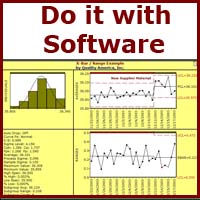Tools
Concepts
Deming Profound Knowledge & Systems Thinking
Deming on Management of People
Applications
Difference between TQM and Six Sigma
Importance of SPC to Quality Management System Performance
W. EDWARDS DEMING
An excerpt from The Handbook for Quality Management (2013, McGraw-Hill) by Paul Keller and Thomas Pyzdek
Deming is probably best known for his theory of management as embodied in Deming's 14 points for management. According to Deming, “The 14 points all have one aim: to make it possible for people to work with joy.” See also Deming on Management of People.
Deming also described a system of “profound knowledge” consisting of four parts: appreciation for a system, knowledge about variation, theory of knowledge, and psychology.
A system is a network of interdependent components that work together to accomplish the aim of the system. The system of profound knowledge is itself a system. The parts are interrelated and cannot be completely understood when separated from one another. Systems must be managed. The greater the interdependence of the various system components, the greater the need for management. In addition, systems should be globally optimized; global optimization cannot be achieved by optimizing each component independent of the rest of the system.
Systems can be thought of as networks of intentional cause-and-effect relationships. However, most systems also produce unintended effects. Identifying the causes of the effects produced by systems requires understanding of variation—part 2 of the Deming system of profound knowledge. Without knowledge of variation people are unable to learn from experience. There are two basic mistakes made when dealing with variation: 1) reacting to an outcome as if it were produced by a special cause, when it actually came from a common cause, and 2) reacting to an outcome as if it were produced by a common cause, when it actually came from a special cause. The terms special cause and common cause are operationally defined by the statistical control chart, discussed in detail in Chap. 9.
The Deming theory of profound knowledge is based on the premise that management is prediction. Deming, following the teachings of the philosopher C.I. Lewis, believed that prediction is not possible without theory. Deming points out that knowledge is acquired as one makes a rational prediction based on theory, then revises the theory based on comparison of prediction with observation. Knowledge is reflected in the new theory. Without theory, there is nothing to revise, i.e., there can be no new knowledge, no learning. The process of learning is operationalized by the Deming Plan-Do-Study-Act cycle (a modification of the Shewhart Plan-Do-Check-Act cycle). It is important to note that information is not knowledge. Mere “facts” in and of themselves are not knowledge. Knowing what the Dow Jones Industrial Average is right now, or what it has been for the last 100 years, is not enough to tell us what it will be tomorrow.
Psychology is the science that deals with mental processes and behavior. In the Deming system of profound knowledge, psychology is important because it provides a theoretical framework for understanding the differences between people, and provides guidance in the proper ways to motivate them.
Learn more about the Quality Management tools for process excellence in The Handbook for Quality Management (2013, McGraw-Hill) by Paul Keller and Thomas Pyzdek or their online Quality Management Study Guide.





